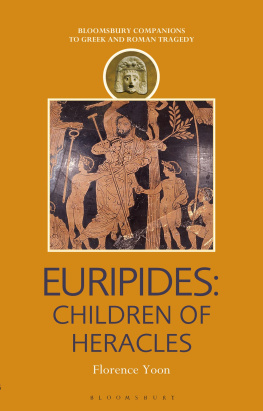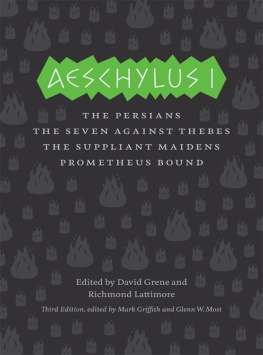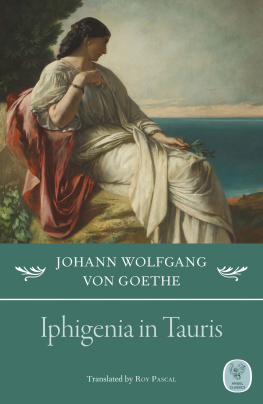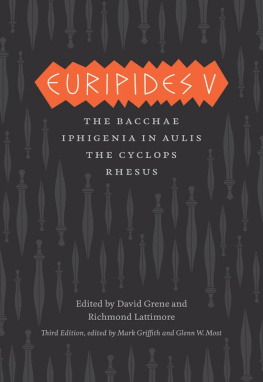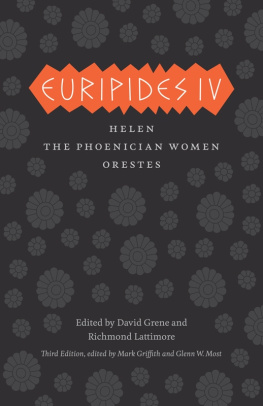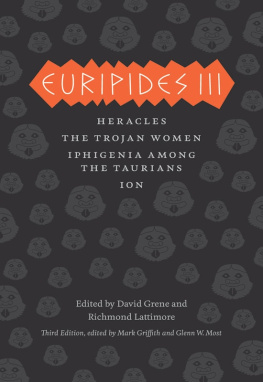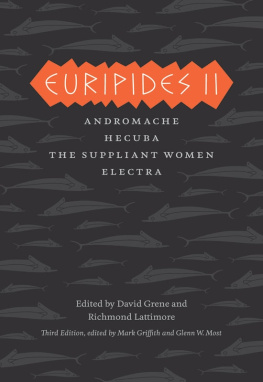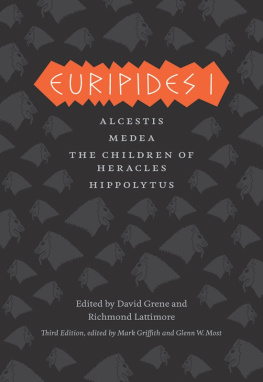Euripides - Orestes, and other plays
Here you can read online Euripides - Orestes, and other plays full text of the book (entire story) in english for free. Download pdf and epub, get meaning, cover and reviews about this ebook. City: Harmondsworth, year: 2009;1972, publisher: Penguin Group USA, Inc., genre: Science. Description of the work, (preface) as well as reviews are available. Best literature library LitArk.com created for fans of good reading and offers a wide selection of genres:
Romance novel
Science fiction
Adventure
Detective
Science
History
Home and family
Prose
Art
Politics
Computer
Non-fiction
Religion
Business
Children
Humor
Choose a favorite category and find really read worthwhile books. Enjoy immersion in the world of imagination, feel the emotions of the characters or learn something new for yourself, make an fascinating discovery.
- Book:Orestes, and other plays
- Author:
- Publisher:Penguin Group USA, Inc.
- Genre:
- Year:2009;1972
- City:Harmondsworth
- Rating:3 / 5
- Favourites:Add to favourites
- Your mark:
- 60
- 1
- 2
- 3
- 4
- 5
Orestes, and other plays: summary, description and annotation
We offer to read an annotation, description, summary or preface (depends on what the author of the book "Orestes, and other plays" wrote himself). If you haven't found the necessary information about the book — write in the comments, we will try to find it.
Orestes, and other plays — read online for free the complete book (whole text) full work
Below is the text of the book, divided by pages. System saving the place of the last page read, allows you to conveniently read the book "Orestes, and other plays" online for free, without having to search again every time where you left off. Put a bookmark, and you can go to the page where you finished reading at any time.
Font size:
Interval:
Bookmark:
 ORESTES AND OTHER PLAYS ADVISORY EDITOR: BETTY RADICE E URIPIDES was an Athenian born in 484 BC . A member of a family of considerable rank, he disliked performing the public duties expected of him, preferring a life of introspection. Such a man was likely to win only grudging admiration and little popularity, and during fifty years writing of plays for the festivals of Dionysus he was awarded the prize only four or five times. His unpopularity seems to have come to a head towards the end of his life in some way unknown to us, and he went into voluntary exile at the court of Archelaus, king of Macedon; it was during these last months that he wrote what many consider his greatest work, The Bacchae. When news of his death reached Athens in 407 Sophocles appeared publicly in mourning for him. Euripides is thought to have written about ninety-two plays, of which seventeen known to be his survive.
ORESTES AND OTHER PLAYS ADVISORY EDITOR: BETTY RADICE E URIPIDES was an Athenian born in 484 BC . A member of a family of considerable rank, he disliked performing the public duties expected of him, preferring a life of introspection. Such a man was likely to win only grudging admiration and little popularity, and during fifty years writing of plays for the festivals of Dionysus he was awarded the prize only four or five times. His unpopularity seems to have come to a head towards the end of his life in some way unknown to us, and he went into voluntary exile at the court of Archelaus, king of Macedon; it was during these last months that he wrote what many consider his greatest work, The Bacchae. When news of his death reached Athens in 407 Sophocles appeared publicly in mourning for him. Euripides is thought to have written about ninety-two plays, of which seventeen known to be his survive.
P HILIP V ELLACOTT has translated the following volumes for the Penguin Classics; the complete plays of Aeschylus, the complete plays of Euripides, and a volume of Menander and Theophrastus. He was educated at St Pauls School and Magdalene College, Cambridge, and for twenty-four years he taught classics (and drama for twelve years) at Dulwich College. He has lectured on Greek drama on ten tours in the USA, and has spent four terms as Visiting Lecturer in the University of California at Santa Cruz. He is also the author of Sophocles and Oedipus (1971), Ironic Drama: A Study of Euripides Method and Meaning (1975), The Logic of Tragedy: Morals and Integrity in Aeschylus Oresteia (1984) and An English Readers Guide to Aeschylus Oresteia (1991). EURIPIDES
 TRANSLATED WITH AN INTRODUCTION BY PHILIP VELLACOTT PENGUIN BOOKS PENGUIN BOOKS Published by the Penguin Group Penguin Books Ltd, 80 Strand, London WC2R 0RL, England Penguin Books USA Inc., 375 Hudson Street, New York, New York 10014, USA Penguin Books Australia Ltd, Ringwood, Victoria, Australia Penguin Books Canada Ltd, 10 Alcorn Avenue, Toronto, Ontario, Canada M4V 3B2 Penguin Books (NZ) Ltd, 182190 Wairau Road, Auckland 10, New Zealand Penguin Books Ltd, Registered Offices: 80 Strand, London WC2R 0RL, England This translation first published 1972 Copyright Philip Vellacott, 1972 All rights reserved The terms for the performances of these plays may be obtained from the League of Dramatists, 84 Drayton Gardens, London SW10 to whom all applications for permission should be made Except in the United States of America, this book is sold subject to the condition that it shall not, by way of trade or otherwise, be lent, re-sold, hired out, or otherwise circulated without the publishers prior consent in any form of binding or cover other than that in which it is published and without a similar condition including this condition being imposed on the subsequent purchaser ISBN: 9781101493472
TRANSLATED WITH AN INTRODUCTION BY PHILIP VELLACOTT PENGUIN BOOKS PENGUIN BOOKS Published by the Penguin Group Penguin Books Ltd, 80 Strand, London WC2R 0RL, England Penguin Books USA Inc., 375 Hudson Street, New York, New York 10014, USA Penguin Books Australia Ltd, Ringwood, Victoria, Australia Penguin Books Canada Ltd, 10 Alcorn Avenue, Toronto, Ontario, Canada M4V 3B2 Penguin Books (NZ) Ltd, 182190 Wairau Road, Auckland 10, New Zealand Penguin Books Ltd, Registered Offices: 80 Strand, London WC2R 0RL, England This translation first published 1972 Copyright Philip Vellacott, 1972 All rights reserved The terms for the performances of these plays may be obtained from the League of Dramatists, 84 Drayton Gardens, London SW10 to whom all applications for permission should be made Except in the United States of America, this book is sold subject to the condition that it shall not, by way of trade or otherwise, be lent, re-sold, hired out, or otherwise circulated without the publishers prior consent in any form of binding or cover other than that in which it is published and without a similar condition including this condition being imposed on the subsequent purchaser ISBN: 9781101493472 In the accounts offered of these plays it will be suggested that the legendary situations and characters described are in many cases analogous to contemporary Athenian politics. This is not to contend that the whole purpose of these plays was political; for a large part of the audience their prime interest was that of dramatic entertainment. The political and moral significances were there for those who would to observe and consider; and to us their truth may well appear timeless. Above all, in every play there is the universal quality of a comment on human life presented as a work of art. In some plays it can be called the art of tragedy, in others not; but the line is difficult to draw. The universal aspect of these plays is something that each reader will be able, in the degree appropriate to himself, to perceive and evaluate; it does not need to be always pointed out.
The particular relation of each play to issues of the time needs some exposition; but the attention given to this aspect should not induce the reader to think it more important than the universal aspect, which is concerned with the artistic statement of philosophic truths. A play can be both a tract and a tragedy, and everyone who goes to a theatre has the right to say what he finds there. Some of these six have strong melodramatic elements; but merely to class them as melodramas says nothing about them worth saying. All are based on the traditional cycles of heroic legend. They differ widely in both form and content; interpretation of them has also been varied. They contain some of Euripides finest poetic and dramatic writing.
They have in common one dominant concern, one pervading method, and one persistent message. The dominant concern is the war between the Athenians and the Spartans which began in 431 B.C . and ended in 404 with the total defeat of Athens and the demolition of her defences. The plays appear here in their chronological order, and the first three belong to the first decade of the war, when Athenian confidence remained high. From 421 to 418 there was a partial and uneasy peace which gave both sides time to recover their energy before beginning again. In 416 the Athenians annihilated the small island state of Melos, killing all the men and selling the women and children as slaves; this ferocious act (and it was not the first such act of which Athens had been guilty) inspired Euripides to write The Women of Troy, which he produced the following spring when a large Athenian army and fleet was about to set sail against Syracuse.
This Sicilian expedition, the greatest ever undertaken by any Greek state, ended in 413 with the destruction of the entire Athenian army and fleet; a blow from which Athens never recovered. The last three plays in this book were produced in 409, 408, and 405; and they are overshadowed by the prospect of the final defeat of Athens which grew steadily more certain. From the beginning there was in Athens a political faction opposed to the war. The Athenian constitution safeguarded free speech; and this right was no formal pretence, as is evident from the outspoken ridicule which Aristophanes poured, at the public expense, upon leading politicians and generals. But the position of the tragic dramatist was, if he cared to use it, one of special power. In Aristophanes Frogs Dionysus makes it clear that Athenians looked to the poets for wise guidance on matters affecting the welfare of the city; they came to the theatre, not merely for entertainment or for intellectual and emotional stimulus, but for instruction; and having received it, if they did not like it, they might well be hostile to the man who offered it.
Euripides knew that the war was a constant preoccupation with most of his audience, and increasingly so as the years passed. In the first three plays in this book he examines the ethics of war, studies the effects of war upon public and private life, pictures the attitudes some heroic and others contemptible which war encourages; he scrutinizes the ideologies which foster and excuse war; and insists that war does not alter the truth that revenge is wrong and mercy is compatible with military valour. In the last three plays he is addressing citizens who do not remember how or why the war began, who are still fighting because they cannot stop, and who in despair have lost both reason and morality. The dramatist, like his fellow-citizens, has the right of free speech; but to exercise it is for him more dangerous. He must find a method which will not provoke his hearers to silence him out of hand. The pervading method which Euripides used in these plays was irony.
Next pageFont size:
Interval:
Bookmark:
Similar books «Orestes, and other plays»
Look at similar books to Orestes, and other plays. We have selected literature similar in name and meaning in the hope of providing readers with more options to find new, interesting, not yet read works.
Discussion, reviews of the book Orestes, and other plays and just readers' own opinions. Leave your comments, write what you think about the work, its meaning or the main characters. Specify what exactly you liked and what you didn't like, and why you think so.


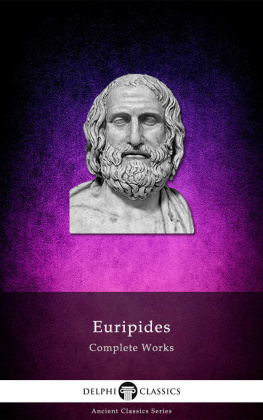
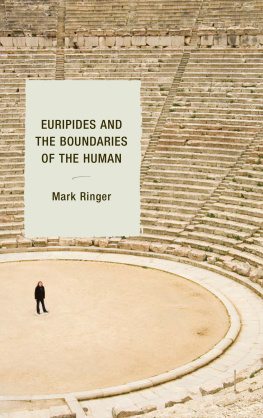
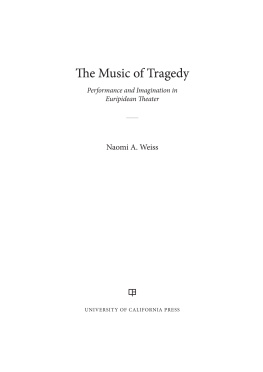
![Euripides - Classic Greek Drama: 10 Plays by Euripides in a Single File [NOOK Book]](/uploads/posts/book/43473/thumbs/euripides-classic-greek-drama-10-plays-by.jpg)

